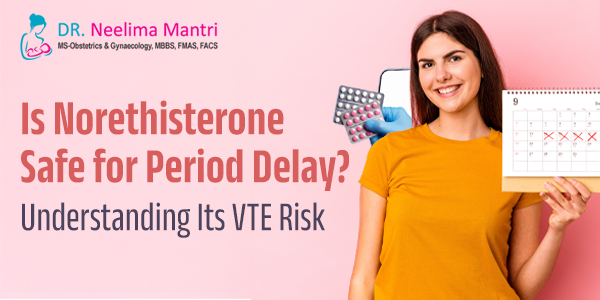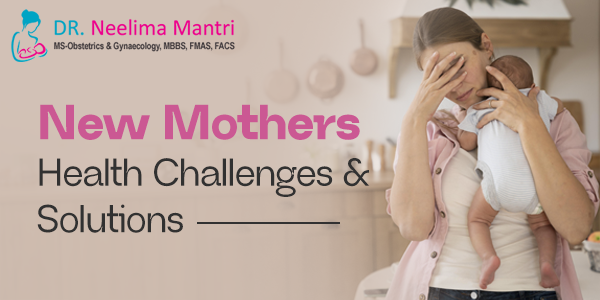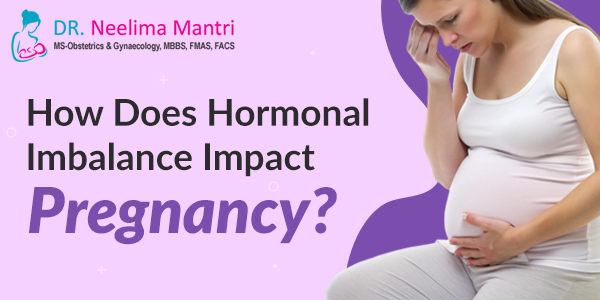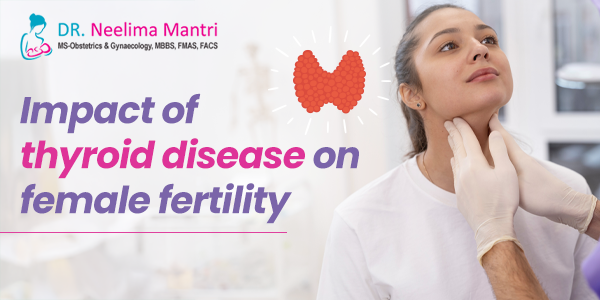
by Dr Neelima Mantri | Jan 21, 2026 | Blog, Gynecologist
Pregnancy changes the body in many ways. One of the most common questions women ask after giving birth is when their period will return. Some expect it to come back within weeks, while others may not see it for several months. Every experience is different. That is why understanding the timing and nature of your first period after delivery can help you prepare better for the postpartum phase.
When Do Periods Return After Pregnancy?
The return of menstruation after childbirth does not follow a set rule. It depends on how the body heals and whether the woman is breastfeeding. For some, the first period may arrive within six to eight weeks. For others, it may take longer.
Hormones play a large role in this timing. If you are not breastfeeding, your period may come back sooner. But if you are nursing, especially exclusively, your cycle may pause for several months. Many women wonder how long after delivery do periods return, but there is no fixed number. Every body works at its own pace.
How Breastfeeding Affects Periods After Delivery
Breastfeeding affects hormone levels. The hormone responsible for milk production, called prolactin, also delays ovulation. This is why many women do not get their periods while breastfeeding. However, it is still possible to ovulate and become pregnant even before the first postpartum period.
Hence, it is imperative to use protection [if you are not planning another pregnancy]. Periods after breastfeeding often return once feeding frequency drops or solid foods are introduced. This process can vary, so staying alert to changes in the body is always helpful.
What to Expect From Your First Period After Childbirth
The first period after childbirth may feel different from your pre-pregnancy cycle. It could be heavier, lighter, more painful, or completely irregular [as these changes are linked to hormone shifts and uterine recovery].
Postpartum periods may also bring more noticeable mood changes and fatigue. Some women report heavy flow or clots [especially during the first few cycles]. For women who had a caesarean, periods after C-section may also vary. Healing from surgery can affect the uterus and change the flow or timing for a few months.
When to See a Gynaecologist for Postpartum Period Problems
If your periods remain extremely heavy, painful, or irregular beyond a few cycles, it is best to speak to a doctor. You should also watch out for signs such as foul-smelling discharge, large clots, or sudden cramps [indicating infection or other complications]. When cycles do not return even after stopping breastfeeding for months, medical review is important.
Therefore, seeking assistance from a trusted Gynaecologist in Mumbai streamlines and manages such complications. Be sure to consult Dr Neelima Mantri for ongoing support during postpartum recovery and menstrual health.
Conclusion
The journey through postpartum recovery includes more than just feeding and rest. Understanding your period after pregnancy is an important part of staying in tune with your health. Some women get their period within weeks while others wait several months.
The return of menstruation after childbirth may bring some surprises [be it a vaginal delivery or a C-section]. Each cycle is your body’s way of returning to balance. By paying attention and seeking help when needed, you can make this transition smoother and more manageable.

by Dr Neelima Mantri | Dec 22, 2025 | Blog, Gynecologist
Delaying your period can feel like a simple choice when you are planning a trip, wedding, or exam schedule. Many women turn to medication for this purpose, especially if their cycle is regular but inconvenient. One such option is norethisterone. It is often prescribed to hold off menstruation for a few days or even up to two weeks. But what about the risks? Is it really safe for everyone? Join us as we debunk these fundamentals.
What Is Norethisterone and How Does It Delay Periods?
Norethisterone is a synthetic hormone that is similar to progesterone. It works by ensuring that the uterine lining continues to develop and does not come off prematurely. When taken a few days before the period is expected, this postpones the onset of the bleeding until the tablets are stopped.
The typical dosage is 5 mg taken three times a day. Most doctors suggest using it for no more than 17 days. Once you stop the medication, the period usually begins within two to three days. The method is reliable for most users and offers short-term control over timing.
Is Norethisterone Safe? Understanding Its Benefits and Common Side Effects
For many, the answer is yes! In the short term, and when properly prescribed, norethisterone usually is well tolerated. It has been used for decades and is deemed to be a practical tool to delay bleeding.
However, norethisterone’s safety for period delay must be viewed case by case. Some users report mild side effects such as nausea, headache, mood changes, and breast tenderness. In a few cases, women notice spotting or period changes in the cycle that follows.
Still, these are manageable for most. The real concern arises when norethisterone is taken by people with underlying health risks.
VTE Risk: Can Norethisterone Increase Blood Clot Formation?
One of the serious concerns is the possibility of a blood clot. This is referred to medically as venous thromboembolism (VTE). The condition can include deep vein thrombosis (usually in the leg) or pulmonary embolism (clot reaching the lungs).
The VTE risk menstrual delay pills carry is low but still important. Since norethisterone acts like progesterone, it may increase clotting tendency slightly. For someone with no other risks, this may not be a problem. But if you have a history of blood clots, obesity, recent surgery, or a strong family history, you must tell your doctor before starting the medication. Understanding the blood clot risk with norethisterone is crucial, especially in hot or long-distance travel situations where the body may already be under stress.
Who Should Avoid Norethisterone? Safer Alternatives for Period Delay
The list includes those with past clotting disorders, certain liver conditions, hormone-sensitive cancers, or unexplained vaginal bleeding. The guidance on who should not take norethisterone also applies to those with migraine with aura, poorly managed blood pressure, or active cardiovascular problems.
In such cases, other solutions may be recommended. Some oral contraceptives or IUD-based approaches may offer better control with reduced risk. Consulting a gynaecologist before using any hormonal pill for delay is essential.
Women seeking a safer option can start by speaking with experts. Many consider the best gynaecologist for menstrual issues Mumbai for personalised advice, especially before taking medication for non-medical timing reasons. Patients facing recurrent hormonal disturbances may benefit from long-term evaluation and period irregularities treatment Dr Neelima Mantri or other qualified professionals provide in major centres.
Conclusion
Delaying a period using medication can feel like a convenience, but it must be handled with care. Norethisterone is effective for many, but not risk-free. Understanding when to use it and when to skip it protects your health while giving you more control over your cycle. It is always better to choose informed care over quick fixes. Speak to a trusted gynaecologist before making any changes to your hormonal routine.

by Dr Neelima Mantri | Sep 6, 2025 | Blog, Gynecologist
The journey of childbirth brings both joy and stress. While the baby becomes the focus of everyone around, the mother’s body goes through silent changes that are often overlooked. These changes are not just physical but emotional as well.
From body aches to mood shifts, this period brings several new layers of recovery. Most women go through these shifts without fully understanding what is normal and what needs support.
This is why the role of a trusted doctor becomes critical during this stage. Many new mothers search for the best female gynaecologist in Mumbai to guide them through recovery and help them stay healthy during the weeks after delivery.
Understanding What New Mothers Go Through
After childbirth, the body begins to return to its pre-pregnancy state. The uterus starts shrinking back to its original size. The muscles feel weak. There is soreness around the pelvic region. Hormone levels change without warning. Sleep becomes disturbed. Breastfeeding comes with its own set of physical demands.
All of this takes place while the mother is adjusting to a new routine filled with feeding cycles and sleep gaps. These are common new mothers’ health challenges, and while they are expected, they must be addressed before they grow into more serious health concerns.
Common Health Issues and What Helps
One of the first concerns most new mothers raise is body pain. This includes lower back discomfort along with neck stiffness caused by the feeding posture. Bleeding may last longer than expected. There may be stitches that take time to heal.
Constipation becomes frequent. Emotional changes are also common. Some women feel low for hours each day. Some go through complete emotional withdrawal. If any of these symptoms last longer than two weeks, they must be shared with a doctor.
The best solutions for new mothers’ health problems include timely check-ups, simple physical therapy, nutrition support, and open emotional counselling. All of these work together to help the body reset at a steady pace.
How Can New Mothers Recover Faster After Childbirth
Recovery does not follow a fixed timeline. Some women bounce back within weeks, while others take longer. The healing depends on overall health before delivery, along with the type of birth and support received at home. That said, a few steady habits help nearly everyone. Nutritious meals rich in iron, along with calcium, keep energy levels steady. Hydration improves sleep along with digestion. Light movement improves blood flow and eases swelling.
Sleep should be adjusted to match the baby’s pattern as closely as possible. Above all, honest conversations with your doctor make a real difference. If you ask how new mothers can recover faster after childbirth, the first step is building a simple plan with your doctor and following it with patience.
Why Choosing the Right Doctor Matters
Recovery becomes easier when the guidance is clear and the support is consistent. This is where the experience of a gynaecologist becomes valuable. They track your healing at every stage and give you early signs to watch for. They help treat hidden infections. They guide you through lactation and postpartum bleeding.
They also support your emotional well-being without judgment. Many women choose the best gynecologist in Mumbai not just for birth but for the weeks that follow. A good doctor stays with you beyond delivery and helps bring stability during the ups and downs of new motherhood.
Every mother deserves care that is consistent and calm. The right recovery does not come from rushing. It comes from knowing what to expect and having a doctor who listens without delay. If you are facing health concerns after childbirth or simply want steady guidance, speak with Dr Neelima Mantri.
She is known as the best female gynaecologist in Mumbai and is often recommended as the best gynecologist in Mumbai for women who want clear advice and steady care. Her support helps new mothers feel confident and stay strong as they step into the next phase of life.

by Dr Neelima Mantri | Aug 8, 2025 | Blog, Gynecologist
Pregnancy depends on balance. Hormones control how your body prepares, supports, and maintains a healthy pregnancy. When those hormones shift too much or too little, problems can occur. Some are mild. Some may need medical attention. Understanding the role of hormones is the first step.
Why Hormones Matter in Pregnancy
Hormones send signals to your body. They prepare the uterus, support the embryo, and help the baby grow. They also help your body change over time to carry the pregnancy to full term. When hormone levels are off, this balance is affected. It can lead to delayed conception, pregnancy complications, or issues with development. Early diagnosis helps manage these problems.
What Hormones Affect Pregnancy the Most?
Several key hormones play a role.
- Progesterone supports the uterine lining and keeps the pregnancy stable. Low levels may lead to spotting or miscarriage risk.
- Oestrogen helps with blood flow and supports the baby’s organs. A sudden drop in oestrogen can affect foetal development.
- hCG (Human Chorionic Gonadotropin) rises early in pregnancy. It signals the body to keep producing progesterone.
- Thyroid hormones support metabolism. If they are too high or too low, they can harm both mother and baby.
- Prolactin prepares your body for breastfeeding. An imbalance here may not affect pregnancy directly, but could impact postpartum recovery.
These hormones work together. One imbalance can trigger issues across the system.
What Are the Signs of Hormonal Imbalance During Pregnancy?
Symptoms may vary. Some are easy to miss. Some overlap with normal pregnancy changes. But the key is to know what is not typical.
- Constant fatigue beyond early pregnancy
- Mood swings that do not improve
- Excessive weight gain or loss without change in diet
- Severe acne or hair loss
- Irregular spotting or cramping
- Low energy despite rest
If you are asking, what are the signs of hormonal imbalance during pregnancy?, these are the red flags. Speak to your gynaecologist if they persist or increase.
When Should You Test Hormones for Pregnancy?
Testing depends on your history and symptoms. If you have had fertility issues, irregular periods, or past miscarriages, early testing is advised. In some cases, hormonal tests are done during pre-pregnancy planning.
How a Gynaecologist Helps Manage Hormonal Imbalance
Gynaecologists monitor changes. They decide what needs treatment and what does not. They may suggest hormone supplements, lifestyle changes, or further scans. Early care makes a big difference in outcomes.
The best gynaecologist for hormonal issues in Mumbai will use updated tests, read results in detail, and explain them in simple terms. If you prefer a woman doctor, the best female gynaecologist in Mumbai will offer a more comfortable space for discussion. When choosing care, always check experience with hormonal cases. The best gynaecologist in Mumbai will be able to handle both mild and complex pregnancy concerns without delay.
Takeaway: Track, Test, and Talk Early
Hormonal imbalance is not rare. But it is manageable. If you notice changes that feel unusual, speak to a doctor early. Hormones shift naturally during pregnancy. What matters is how well your body adapts. With the right support, that balance can be restored.

by Dr Neelima Mantri | May 22, 2025 | Blog, Gynecologist
Tubal ligation is the surgical procedure for permanent birth control. It is a safe, common, and effective surgery where the fallopian tubes are blocked to prevent eggs from reaching the sperm. The surgery is performed under general anaesthetic, takes only 20-30 minutes, and women can go home the same day.
If you already have a basic idea about Tubal Ligation and are looking to improve your awareness about the post-procedure situation – the chance of complications, care, and the importance of recovery, then this blog is for you.
With inputs from the best lady gynaecologist in Mumbai, Dr. Neelima Mantri, we help you understand everything you need to know after tubal ligation surgery.
Tubal Ligation Surgery – Side Effects & Risk Factors
Tubal ligation surgery is performed using a laparoscope (a small camera inserted through a minor incision) or during a C-section or abdominal surgery. Though it is a simple and routine procedure, it requires precision and adequate post-operative care to ensure long-term success.
Neglecting post-surgical care (which most women are unaware of) can increase the risk of side effects or complications. The side effects can be immediate like blood clots, infection, shoulder pain, or back pain. Or they can be delayed side effects, like wound issues, menstrual irregularities, hormonal imbalances, pelvic pain, and even ectopic pregnancy.
That said, pre-existing medical conditions like diabetes, lung disease, heart issues, obesity, and previous abdominal or pelvic surgery can increase the risk of complications or side effects after tubal ligation. So, women undergoing tubal ligation must strictly follow and stick to a standard recovery plan to avoid these complications.
Recovery after Tubal Ligation Surgery: What Every Woman Should Know
Tubal ligation is typically performed with laparoscopy (mini-laparotomy), during C-section, or using hysteroscopy. Regardless of the procedure used, each tubal ligation involves surgical incisions that need time to heal properly and prevent infections.
Here is some key advice every gynaecologist gives patients for a successful recovery after tubal ligation surgery:
- Mild pain and cramping are common:Post-operative pain, some discomfort, and mild bloating are the most common symptoms after the surgery.
- Always monitor the signs of infection: Every surgical procedure carries the risk of infection. So, it’s important to ensure proper wound care by monitoring signs of infection like fever or redness.
- Avoid strenuous activity after the surgery:Strenuous activities involving heavy lifting should be completely avoided, as they increase the risk of pain or issues at the incision site.
- Allow the body to adjust to the routine naturally:Returning too quickly to regular activities increases the risk of complications. Since surgical manipulation and anaesthesia demand adequate recovery, we suggest women rest and slowly return to normal activities, says a gynaecologist in Mumbai, Dr. Neelima Mantri
- Detect problems early:After tubal ligation surgery, the recovery process must be carefully monitored for any unusual issues or complications. Women are advised to stay attentive to their bodies and contact a gynaecologist in case any signs like fever, heavy bleeding, or signs of infection develop.
Whether you are a woman looking for expert guidance on tubal ligation or you’ve already been through the procedure and are experiencing any of the symptoms mentioned above, we suggest you consult a gynaecologist immediately. If you are in Mumbai, Dr. Neelima Mantri is one of the top lady gynaecologists in Mumbai with an exceptional track record in guiding women to a safe and successful recovery after tubal ligation surgery.

by Dr Neelima Mantri | Apr 17, 2025 | Blog, Gynecologist
The thyroid gland is a small gland, but it plays an essential role in the proper functioning of a woman’s body. This is a butterfly-shaped gland situated in the front of the neck and secretes hormones that affect almost all the organs of the body. These hormones are especially important in regulating metabolism, energy levels, and the reproductive system.
When the thyroid does not function properly, it can lead to menstruation problems and complications related to fertility. It is crucial to know the relationship between the thyroid and the female reproductive system so that any problems can be detected and treated on time.
The Role of the Thyroid in Female Reproduction
Thyroid hormones play a role in the regulation of the menstrual cycle and the secretion of reproductive hormones, including oestrogen and progesterone. If these hormones are imbalanced, the whole reproductive system may be thrown off balance as well. Hypothyroidism and hyperthyroidism can also affect ovulation and thus make it hard for women to conceive.
This is because even slight alterations in thyroid hormones can disrupt the ovulation cycle and its rhythm. For this reason, thyroid function is closely checked in women with fertility issues or irregular menstrual cycles.
Menstruation Problems Linked to Thyroid Imbalance
Thyroid disorders are common among women, and these women are likely to experience several menstruation complications depending on the state of their thyroid gland. Hypothyroidism may cause the periods to be heavy, long, and more often, while hyperthyroidism may cause light, short, or infrequent periods. Sometimes, women may have to endure amenorrhoea, which is a condition where there are no periods at all.
These irregularities can make it difficult to determine when the woman is most likely to conceive, which only adds to the challenges of conception. It also brings mood swings, fatigue, and weight changes, which are also very stressful to a woman’s physical and mental health. These symptoms are often associated with other illnesses, so it is important to perform thyroid tests to determine the cause of the irregular menstrual cycle.
Impact on Fertility and Conception
There is ample evidence in the literature that connects thyroid disorders with female infertility. This means that when the hormone levels are not balanced, ovulation may not take place in the normal cycle or may not occur at all. This can lower the chances of pregnancy even in otherwise healthy women.
In India, a large number of women undergo female infertility treatment in Mumbai, and thyroid disorders are the first to be diagnosed. Treating the thyroid may help to regulate the menstrual cycle and fertility in some cases, and pregnancy can be achieved without the use of assisted reproductive technologies.
Moreover, if thyroid disorders are not treated during pregnancy, it can be dangerous for both the mother and the foetus. This makes early diagnosis and management crucial not only for conception but also for a healthy pregnancy.
Seeking the Right Support
In cases of chronic irregular menstrual cycles or infertility, it is advisable to seek the services of a doctor who knows the relationship between thyroid and fertility. Most people start this process by consulting the best gynaecologist in Mumbai for infertility, where they are subjected to thyroid tests, hormonal tests, and counselling.
Treatment may involve the use of drugs to balance thyroid hormones, changes in diet, and tracking of menstrual and ovulation cycles. In some cases, other treatments or fertility treatments may be suggested depending on the degree of the problem.
The thyroid gland has a more crucial role in a woman’s fertility than many people are aware of. From menstrual issues to reproductive issues, hormonal imbalances can profoundly affect a woman.
This paper aims to highlight the signs of hormonal imbalance and the need for women to consult a doctor in order to address the issue and enhance the chances of conception. Treating thyroid disorders not only helps in fertility but also in the overall health of a woman.
How to Manage Hypothyroidism During Pregnancy?
Pregnancy places extra demands on the thyroid gland. This small organ in the neck produces hormones that support the brain, bones, and metabolism of the developing baby. When the thyroid does not produce enough hormones, the condition is known as hypothyroidism. During pregnancy, this can create risks for both mother and child. With timely treatment, most women go on to have healthy pregnancies and healthy babies.
Best Natural Remedies for Thyroid Hormone Imbalance
Natural methods can support thyroid function, but they are not a replacement for prescribed medication. During pregnancy, iodine intake becomes even more important. Iodised salt, dairy, and cooked seaweed may help support thyroid hormone production. Selenium and zinc from sources like sunflower seeds, fish, and legumes also contribute to thyroid stability.
Gentle yoga and breathing exercises may help manage stress [which sometimes affects thyroid function]. However, pregnant women should not take supplements or make major dietary changes without guidance. What helps one woman may not be safe for another. The goal is to support your health without putting your baby at risk.
Symptoms of Thyroid Disorders in Women Over 40
Thyroid issues become more common with age. Many women over 40 report unexplained tiredness, thinning hair, or irregular cycles. These symptoms are often dismissed as early signs of menopause. In some cases, the thyroid is the real cause.
Cold sensitivity, sluggishness, and dry skin are also common. If left untreated, low thyroid hormone levels can affect heart health, bone strength, and cognitive function. During pregnancy, the risks are even higher. Routine blood tests can detect problems early. Diagnosis is quick. The treatment is usually simple.
Impact of Thyroid Disease on Female Fertility

Thyroid hormones regulate ovulation. When levels are low, ovulation may not occur at all. This makes conception more difficult. Many women dealing with delayed cycles or unexpected bleeding patterns are later found to have thyroid disorders. Addressing these issues is part of modern fertility care.
Clinics offering female infertility treatment in Mumbai often include thyroid screening as part of their first consultation. When thyroid levels are corrected, many women see improvements in both their cycle and fertility [for some, this may be the missing link that allows pregnancy to occur].
Treatment Options for Hyperthyroidism and Weight Loss
Hyperthyroidism, the opposite of hypothyroidism, involves excess hormone production. It is less common during pregnancy but still a concern. Symptoms include weight loss, restlessness, palpitations, and heat intolerance.
In severe cases, it can lead to complications such as preterm labour or high blood pressure. Medication may be required. Surgery and radioactive iodine are avoided during pregnancy. A woman with hyperthyroidism must follow a strict plan. Monitoring is frequent. The goal is to keep hormone levels within a safe range for both mother and baby.
How Thyroid Affects Menstrual Cycles and Fertility
Hormonal balance plays a key role in reproductive health. Thyroid disorders can disruptovulation and menstruation. Some women experience long cycles. Others have frequentspotting or heavy bleeding. These patterns can make tracking fertility more difficult.
Clinics providing infertility treatment Mumbai see many women whose thyroid issues were missed earlier. If thyroid hormones are corrected, the body often returns to a more stable rhythm. Women looking for the best gynaecologist in Mumbai for infertility should ensure that thyroid tests are part of their evaluation. Fertility and thyroid care go hand in hand.
Managing hypothyroidism during pregnancy is not about fear. It is about awareness. Thyroid health should not be ignored [be it expecting or planning to conceive]. Early care prevents complications. Consistent monitoring ensures safety. Every pregnancy deserves the best start. And that begins with understanding your own body.
Page 1 of 1312345...10...»Last »








